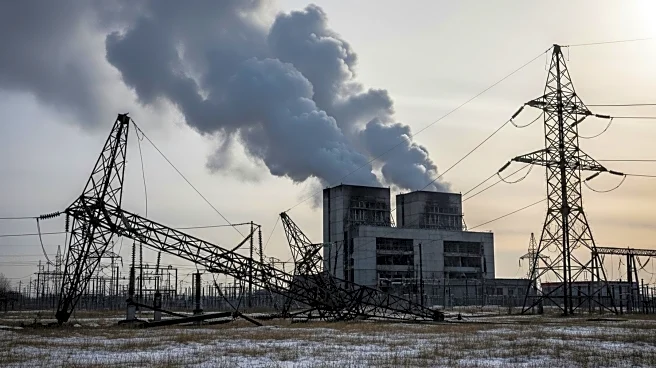What's Happening?
Russia has launched an overnight attack on a Ukrainian thermal power plant, causing significant damage as winter approaches. According to DTEK, Ukraine's largest electricity operator, two workers were injured in the attack. The location of the plant has not been disclosed, as Ukrainian authorities aim to protect intelligence from the enemy. This attack is part of Russia's ongoing campaign to disrupt Ukraine's energy supply, a strategy employed since the invasion began over three years ago. The energy sector remains a critical battleground, with Russia attempting to weaken public morale and military manufacturing by targeting the power grid. Ukraine has responded with long-range strikes on Russian energy supplies, causing outages in border regions.
Why It's Important?
The damage to Ukraine's power infrastructure poses a significant threat as the country heads into winter, a season that runs from late October through March. The coldest months, January and February, could see increased hardship for civilians if energy supplies are compromised. Russia's strategy of targeting energy infrastructure aims to erode public morale and disrupt essential services, potentially impacting military operations and civilian life. The ongoing conflict over energy resources highlights the broader geopolitical tensions between Russia and Ukraine, with implications for regional stability and international relations.
What's Next?
Repair crews in Ukraine are working tirelessly to restore damaged infrastructure, but the threat of further attacks remains. Ukrainian authorities are setting up temporary shelters in affected areas, such as Shostka, to provide warmth, food, and psychological support to residents. As the conflict continues, both countries may escalate their attacks on each other's energy supplies, potentially leading to further disruptions. International stakeholders may increase diplomatic efforts to mediate the conflict and prevent a humanitarian crisis during the harsh winter months.
Beyond the Headlines
The ongoing energy conflict between Russia and Ukraine raises ethical questions about the weaponization of essential services like electricity and heating. The targeting of civilian infrastructure during wartime challenges international norms and humanitarian principles. Long-term, this conflict could lead to shifts in energy policy and security strategies in Europe, as countries reassess their dependence on Russian energy and seek alternative sources.











